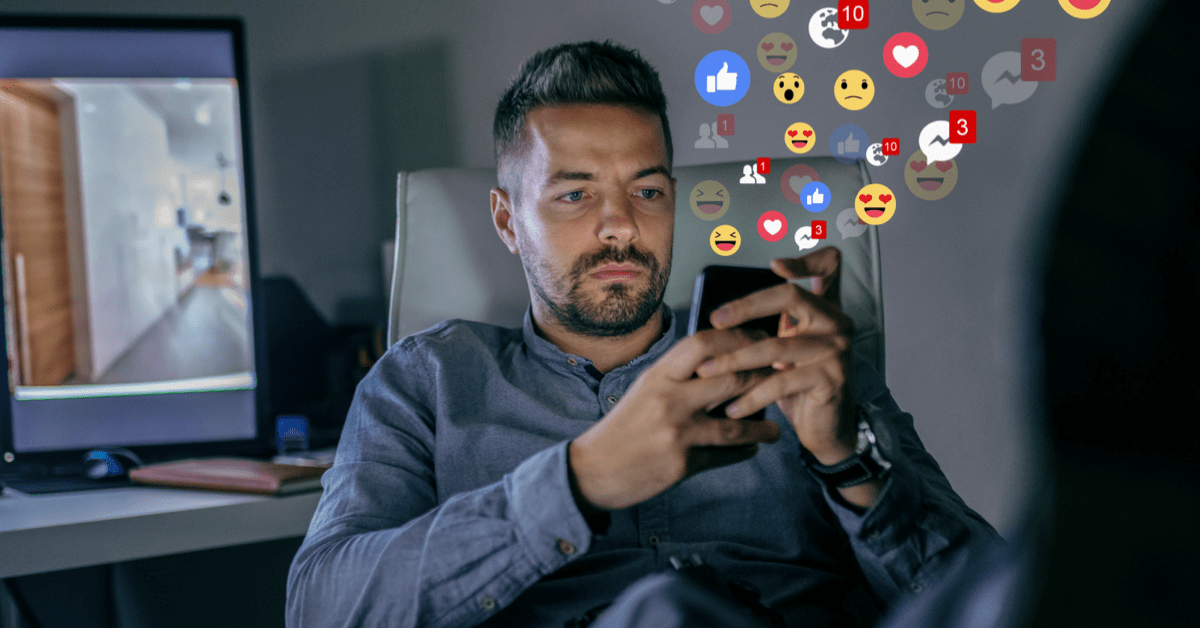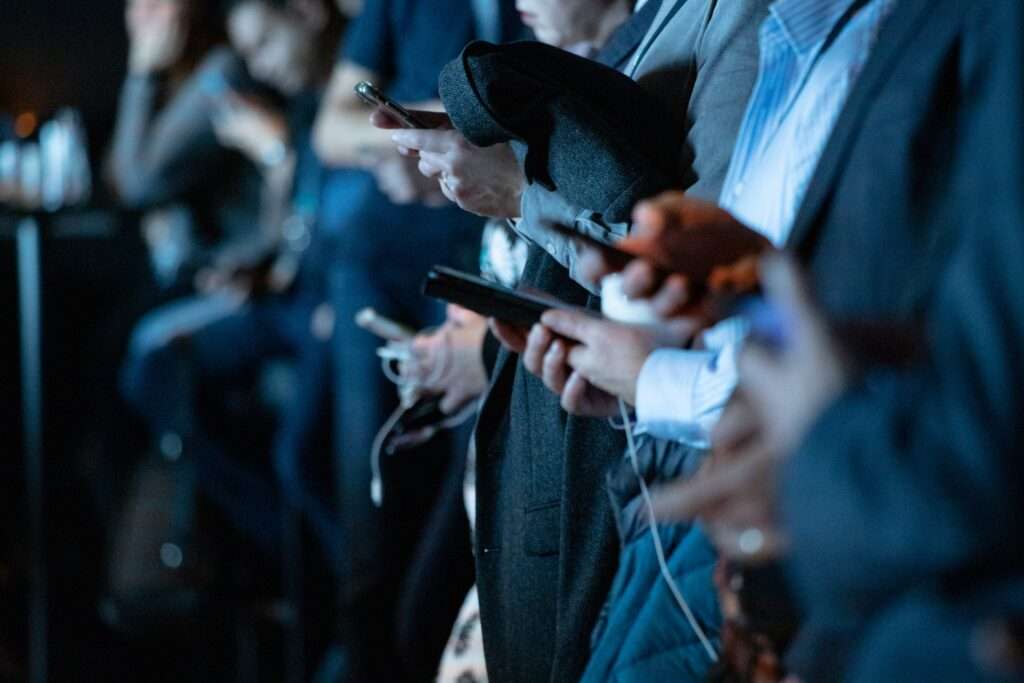Episode Transcript
Social media has grown very quickly in a short amount of time. But what are the implications for mental health as the world becomes more digital and virtual? This episode of Making Friends With Depression examines Social Media and asks, “Does social media cause depression?”
Hi friends, and welcome to another edition of Making Friends with Depression. I am your host, Charles Minguez.
History and Disclaimer
At the top of the show, I like to give a bit of history and a disclaimer so listeners know why I’m doing this whole thing and where I’m coming from.
First, the history.
I’ve lived most of my life with major depression and schizoaffective disorder. I was first diagnosed at 13, and I’m now in my 40’s. So mental illness and wellness have been a big part of my life.
I also have 20-plus years of experience practicing mindfulness. At age 21, I studied yogic philosophy with Dr. Bob Butera at the Yoga Life Institute. Eventually, I committed to becoming a Buddhist and even taught beginner meditation classes.
I volunteered my time with the National Alliance on Mental Illness as a Peer Support Specialist and facilitated meetings for adults experiencing poor mental wellness.
My story, plus my lived experience, is something that I hope others find inspirational. My motivation, however, is to give back and help others. This podcast is one way that I can do that.
Now, the disclaimer.
I’m not a therapist or a counselor. The content on this show is not meant to be taken as medical advice. I’m only trying to inspire hope by sharing my story and techniques that I found helpful during the healing process.

Long before Elon Musk bought Twitter, the platform was instrumental in the ‘Arab Spring,’ a movement that helped protestors demonstrate in the Middle East and North Africa. It was monumental in communities coming together in collective activism.
Facebook has connected almost three billion people around the world. That’s a billion with a ‘B.’ In the U.S., nearly 1 in 4 people are Facebook users. That’s a lot of connection.
Then there’s TikTok. I’m not sure what’s happening over there, but you know what? You’ll find Making Friends With Depression on TikTok.
To think, less than twenty years ago, none of these platforms existed is wild. Twenty years ago, you couldn’t send high-res images of your food to a friend halfway across the globe. And video, forget about it.
Now, you can shoot a Hollywood-quality film about a protest with your phone, upload it to YouTube and then distribute it worldwide on Facebook. That’s pretty amazing if you ask me.
I am fortunate to be old enough to remember what it was like before social media, yet still young enough to embrace these platforms. But what are the implications for mental health as the world becomes more digital and virtual?
Does Social Media Cause Depression?
Recently, I was listening to a podcast, and during the conversation, one of the hosts said something interesting about social media. He said, “The algorithm knows you better than you know yourself.”
What a powerful statement! And as AI tools become more intelligent, there’s also a lot of truth in that statement.
It got me thinking, does social media cause depression? Is social media a good thing? A bad thing? Is social media a tool or something more sinister?
Whatever the answer, social media platforms are not going away anytime soon. There are millions of people around the world using these platforms to connect. You can share this podcast on a social platform. So, is that a bad thing?
Social Media and Depression Potential Pitfalls
The jury is still out on whether or not there’s a direct causation between social media and depression. Part of the reason is that there’s just not enough research, and the explosion of everyday social media use is somewhat of a new phenomenon.
Again, it was less than twenty years ago that the major social media platforms were launched. However, more and more evidence shows the clear benefits of taking breaks from social media.
The most notable benefit of limiting social media use is related to the anxiety associated with FOMO or the Fear of Missing Out. One study at the University of Pennsylvania showed that limiting social media usage to thirty minutes per day could significantly improve overall well-being.

Limiting social media usage could also improve sleep. More people keep their phones in their bedrooms. And if you have your phone next to your pillow, you’re more likely to pick it up, impacting your sleep cycle. You can learn more about this by listening to my first episode.
We all know that FOMO induces anxiety, and poor sleep contributes to many types of depression.
I think there’s a personal connection component here too. If you spend most of your time connecting with others online, you may find it more challenging to do so face-to-face with others. We learn social cues when we’re interacting with others in real life that are missed when we use social media only.
On top of that, people can hide behind social media. They don’t portray their true selves, and it seems easier to have heated arguments turn nasty and violent online.
Social Media and Depression the Upshot
But how about the flip side? If it hasn’t been proven that social media causes depression, can it help with symptoms of depression? Are there potential benefits associated with social media?
Engaging on social media platforms could mean connecting with a community of like-minded individuals with similar experiences. Maybe you’re using a platform like ShareSpace or belong to a private Facebook group. You might feel the most comfortable sharing your experiences and connecting with others in these spaces.
For example, those who experience anxiety and depression can connect with others without being in a room full of unfamiliar faces. As a person living with anxiety and depression, I totally get it.
The Algorithm Knows You Better Than You Know Yourself
Ultimately, whether or not the algorithm knows you better than you know yourself, I think, depends on how you use the platforms.
Are you watching cat videos or doom-scrolling? Maybe you’re watching TED Talks? The algorithm will track this data and feed you an endless loop of related content. This feedback mechanism is somewhat in our control, depending on the content we consume.
It reminds me of how Buddhism defines the nature of the mind and the nature of reality. In Buddhism, it’s said that our outer world appears to us because of the inner world. So what sort of world are we creating with the tools available to us? I think this is where we need to focus when it comes to social media.
Brave New World or Brave New World?
Will it be a brave new world or a brave new world? In the end, social media platforms will strengthen, especially as more AI is integrated. We must ask ourselves, are we scared by this, or do we embrace it? Knowing where you stand with social media will better inform your decisions regarding mental wellness.
If we can embrace these platforms as creation, expression, and communication tools while understanding our limitations, I think we’ll be okay. Use social media to enhance your life, don’t let it use you.
On the other hand, if you feel like you’re getting sucked into a negative feedback loop, maybe it’s time to step away and reevaluate your relationship with social media.
Here are Three Tips that I Would Suggest to Help Limit Your Time on Social Media
- 1Turn off the notifications on your device so that you’re not tempted to go online as soon as a bell chimes. You can silence them too. Plus, many devices will now let you set all notifications to be delivered to you at one time in a summary review. You should utilize these functions.
- 2
Use the screen time functionality on your device to set up downtime and then train yourself to check in only during your active time. Maybe set the downtime to begin an hour before you go to bed so you can wind down for the evening.
What’s really cool about these screen time functionalities is that often you’ll get a report letting you know how many times you’ve checked in on social media and other sorts of platforms. And it’s kind of eye-opening once you begin to see just how many times and how many hours you’re actually spending on those platforms and your device.
- 3Connect with like-minded groups and create something amazing when you are on social platforms. Or use your time on social for learning. Train the algorithm to show you enriching content.
Support the Show!
Okay, friends. Well, that’s a wrap for episode two. Thank you so much for being here. I really appreciate you listening. And if you’d like to learn more about what was discussed in today’s episode, please visit my website, Making Friends With Depression. You’ll find today’s show transcript and resources.
Also, help me spread the word about Making Friends With Depression by sharing this episode with a friend today! Help them to train their algorithm and feedback loop to give them enriching content by sharing this podcast.
And lastly, you can support the show by becoming a Patron or by purchasing something from the Making Friends With Depression merch store. You can find links for the Patreon page and for the merch store on the website Making Friends With Depression.
And the Patreon levels there are three different levels. Each comes with some fun perks and some swag. So make sure to check it out, and you can choose the appropriate level for yourself.
Thank you so much again, and until next time, many blessings.